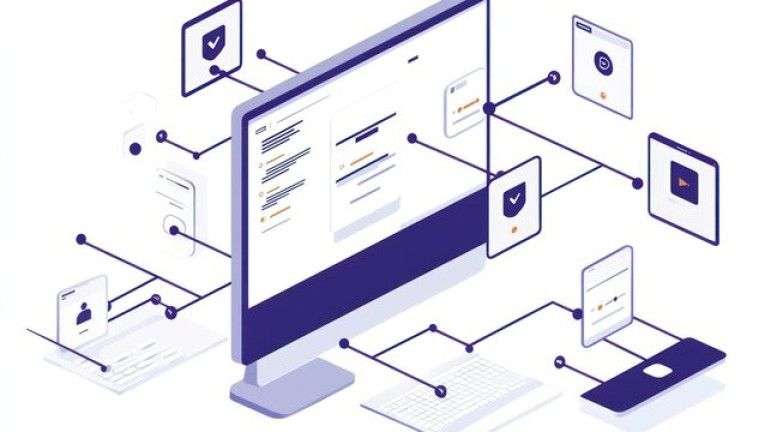Accounting, a fundamental aspect of business operations, is undergoing significant changes, especially with the advent of blockchain technology. Blockchain, often associated with cryptocurrencies, holds the potential to revolutionize many industries, including accounting. I’ll explore how blockchain can impact accounting processes, how it enhances transparency, and how it can simplify record-keeping. I’ll also break down the technical side of this transition, showing real examples and calculations where needed to provide a clearer picture of what this transformation looks like in practice.
Table of Contents
Understanding Blockchain Technology in Simple Terms
Before diving into the impact of blockchain on accounting, it’s essential to grasp the basics of blockchain technology. At its core, blockchain is a decentralized ledger system that securely records transactions across a network of computers. Unlike traditional databases where a central authority controls the records, blockchain operates on a peer-to-peer basis, making it transparent and nearly impossible to alter once data is entered.
Every transaction on a blockchain is verified and recorded in a block. Once the block is filled, it’s added to the chain of previous blocks, forming a permanent and immutable record. This immutability, along with the decentralization, makes blockchain incredibly secure and transparent.
In accounting, where accuracy and security are paramount, blockchain offers a way to streamline processes while reducing errors and fraud.
The Current State of Accounting and the Need for Blockchain Integration
Accounting, as we know it today, has largely remained consistent for decades. Businesses rely on manual and semi-automated processes for record-keeping, often involving multiple parties, such as auditors, accountants, and financial institutions. However, the system is not without its flaws. Errors, fraud, and inefficiencies are commonplace. Transactions often take days to be finalized, and reconciling different ledgers can be a tedious and error-prone process. I have experienced this firsthand as a part of financial reporting tasks.
Blockchain promises to address many of these issues. Its decentralized nature means there is no central point of failure, reducing the likelihood of errors or fraud. Additionally, transactions are processed in real time, ensuring that financial records are up-to-date and transparent. By automating many processes, blockchain can significantly reduce administrative costs and time spent on manual tasks.
How Blockchain Can Transform Accounting
I want to break down the transformation in accounting into several key areas: data integrity, real-time financial reporting, audit processes, and cost reduction.
1. Data Integrity and Security
Data integrity is a core concern in accounting. Blockchain’s ability to create immutable records is crucial here. Once a transaction is entered into a blockchain, it cannot be altered or deleted. This ensures that financial data remains accurate and secure from manipulation or fraud. For instance, if a company’s accounting system is integrated with blockchain, every transaction, such as a purchase or sale, would be logged with an exact timestamp. The entry would be visible to everyone with access to the blockchain, and if anyone tries to alter it, the changes would be immediately visible.
In traditional accounting systems, errors and fraud can be difficult to trace. But with blockchain, the entire transaction history is available for review. This creates an environment where data integrity is ensured at all times.
2. Real-Time Financial Reporting
In traditional accounting, financial reports are often prepared monthly or quarterly. With blockchain, however, businesses can access real-time financial data. As transactions occur, they are immediately recorded on the blockchain, and the financial status of the company is updated in real time.
Let’s look at an example. Suppose I run a company, and a client purchases goods worth $5,000. Traditionally, I would have to wait for the end of the month to record the transaction and update my books. With blockchain, however, the moment the transaction occurs, it is recorded on the blockchain, and my financial records are automatically updated.
3. Streamlining the Audit Process
Blockchain simplifies the audit process. In the current system, auditors must manually check and reconcile multiple records from different departments or systems. This can be time-consuming and prone to human error. With blockchain, auditors can access the complete and accurate transaction history in real time. This transparency not only reduces the chances of fraud but also makes audits faster and more efficient.
In traditional auditing, mistakes or omissions are discovered only after the audit is complete, leading to costly corrections. Blockchain, however, makes these discrepancies immediately visible. If an error is made, it can be spotted and corrected right away.
4. Cost Reduction and Efficiency
With blockchain, many tasks that were previously done manually, such as reconciliation or verifying the authenticity of financial statements, can be automated. This significantly reduces administrative costs and frees up resources for more value-added activities. Blockchain also reduces the risk of fraud, which can otherwise result in costly losses for businesses. Additionally, the reduced need for intermediaries (such as banks or third-party payment processors) further cuts costs.
The Role of Smart Contracts in Blockchain and Accounting
Smart contracts are self-executing contracts with the terms of the agreement directly written into lines of code. They automatically execute when predefined conditions are met. In accounting, smart contracts can help automate tasks such as invoicing, payments, and settlements.
For example, let’s say a company and a vendor agree on a payment schedule. Once the conditions of the agreement are met—say, the goods are delivered—the smart contract automatically triggers the payment. This removes the need for manual intervention and ensures that transactions are carried out promptly and accurately.
Comparing Traditional Accounting vs. Blockchain-Enabled Accounting
To provide a clearer picture, here’s a comparison table between traditional accounting and blockchain-enabled accounting:
| Feature | Traditional Accounting | Blockchain Accounting |
|---|---|---|
| Transaction Validation | Manual checks by accountants or auditors | Automated, decentralized validation |
| Data Integrity | Prone to errors or fraud | Immutable and transparent |
| Real-Time Reporting | Periodic reports (monthly/quarterly) | Real-time updates on transactions |
| Audit Process | Time-consuming and costly | Faster and more efficient due to transparency |
| Cost Efficiency | Higher due to manual processes | Lower due to automation and fewer intermediaries |
| Security | Susceptible to internal errors and fraud | Highly secure with decentralized verification |
As the table illustrates, blockchain-enabled accounting outshines traditional methods in almost every area, from transaction validation to cost efficiency.
The Technical Side of Blockchain Integration in Accounting
Integrating blockchain into existing accounting systems isn’t without its challenges. First, there is the technical complexity of setting up a blockchain network, which requires skilled developers and potentially new infrastructure. Additionally, businesses would need to ensure that their blockchain systems comply with accounting standards and regulations, which can vary by country.
Moreover, there are several blockchain platforms to choose from, such as Ethereum, Hyperledger, and Corda, each offering different capabilities. Businesses must select the one that aligns with their needs. However, the long-term benefits of blockchain, including improved accuracy, speed, and security, often outweigh the initial setup costs.
Examples and Calculations in Blockchain Accounting
Let’s consider a simple example to illustrate how blockchain would work in an accounting scenario.
Imagine a company makes a $10,000 sale. In traditional accounting, the accountant records the transaction manually in the company’s ledger, then sends it to the bank for payment processing. The accountant might enter an error, such as recording $9,000 instead of $10,000, leading to discrepancies.
With blockchain, the transaction would be recorded on the blockchain instantly and immutably. Both the company and the customer would have real-time access to the transaction, ensuring that there are no errors. The transaction would also be automatically validated and settled via smart contracts, removing the possibility of mistakes in the entry or the reconciliation process.
Conclusion: The Future of Accounting with Blockchain
Blockchain has the potential to reshape the accounting industry by offering enhanced security, transparency, and efficiency. As more businesses adopt blockchain, the traditional accounting system may slowly phase out in favor of more advanced, decentralized models. While challenges remain in terms of implementation and regulatory compliance, the benefits of blockchain in accounting are clear: reduced errors, real-time reporting, and cost savings.
As I look toward the future, I see an accounting landscape that is much more streamlined and automated, with blockchain at its heart. The ability to provide transparent, accurate, and up-to-date financial data will be a game-changer for businesses of all sizes. In this new era, accountants will transition from number crunchers to strategic advisors, using blockchain technology to help businesses thrive in an increasingly complex financial world.





